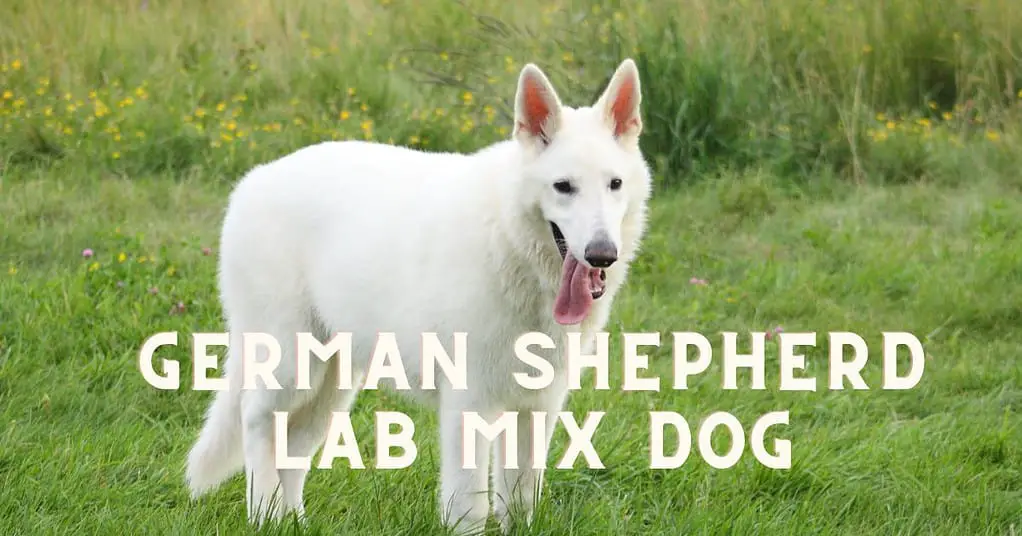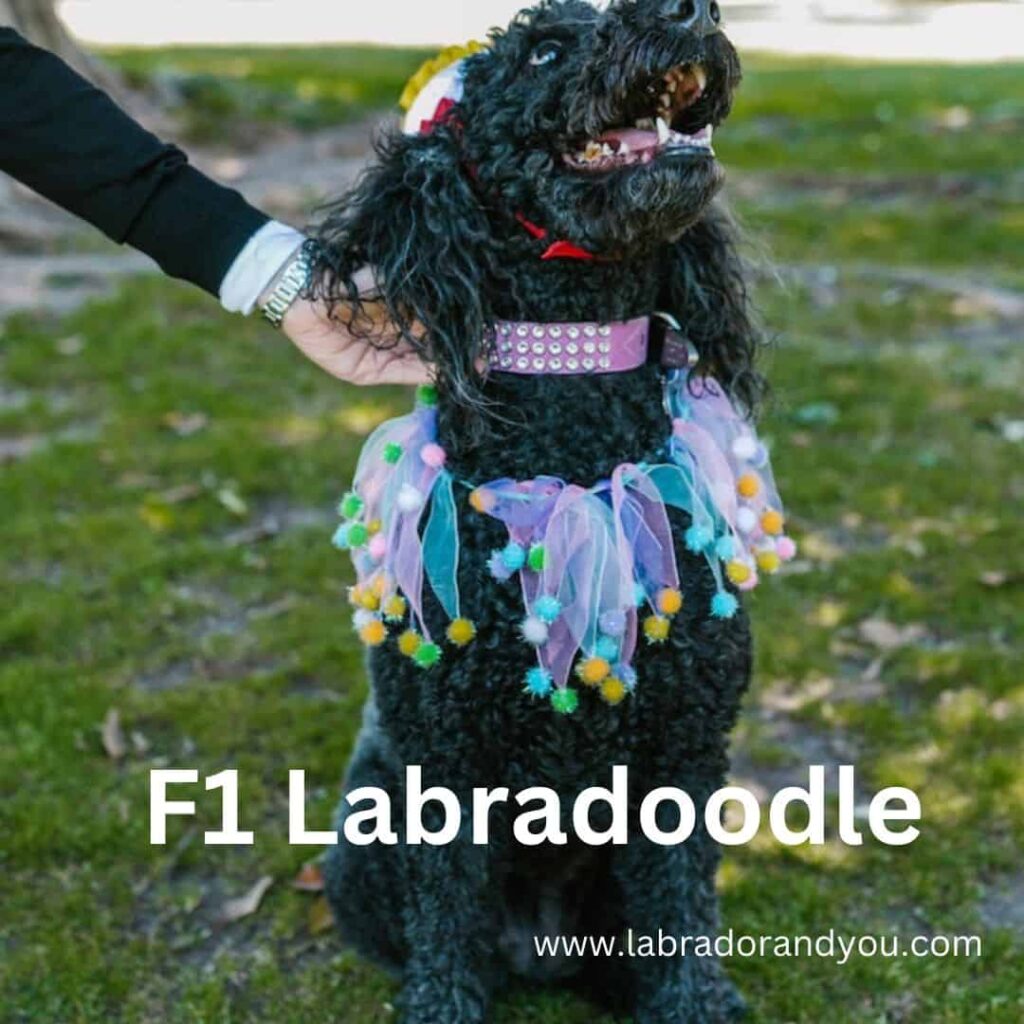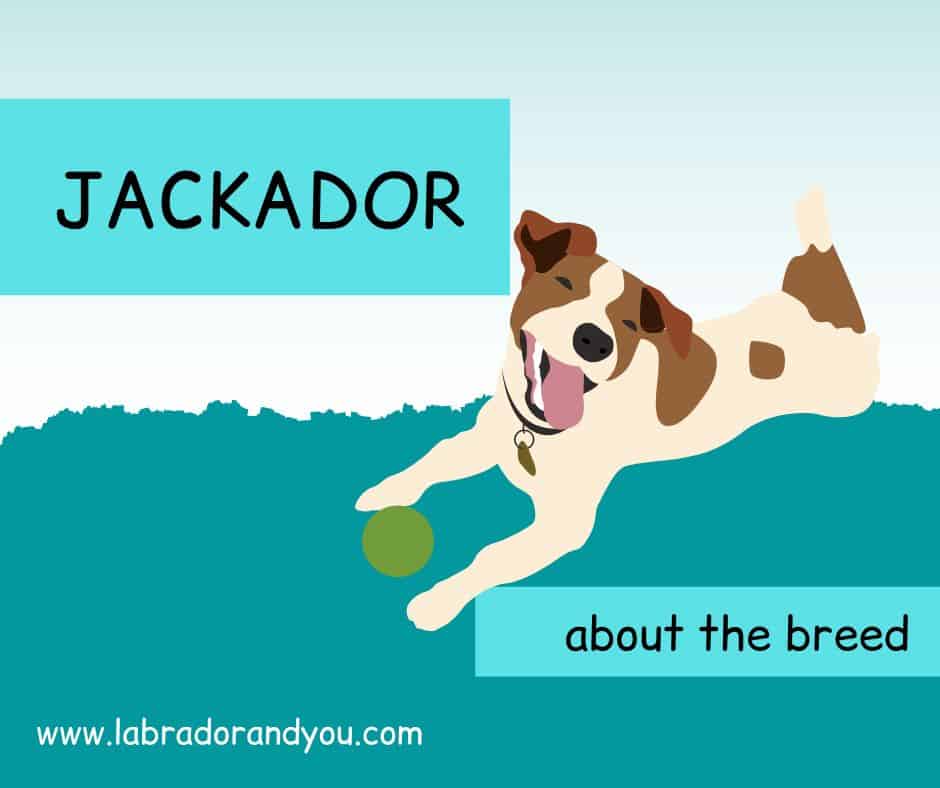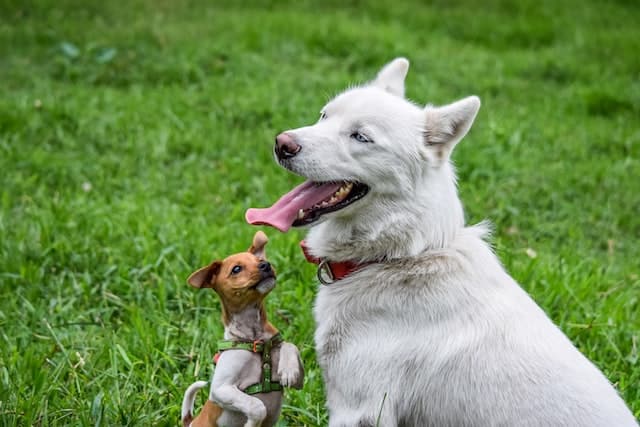The Labernese breed is a cross between the Labrador Retriever and Bernese Mountain Dog, combining the best qualities of both parent breeds. Our guide will help you navigate key information about this beloved breed, from its personality traits to health considerations.
Origins and History of Bernese Mountain Dog Lab
Tracing the roots of the Labernese breed takes us to Newfoundland and Labrador Retrievers in Canada, where it was first developed. The Mira Foundation by Eric St-Pierre (a nonprofit organization dedicated to assisting disabled people) sought to create an ideal dog with the friendly disposition of a Labrador Retriever and the strength and work ethic of Bernese Mountain Dogs.
These combined qualities resulted in an energetic, gentle, adaptable mixed breed called the Laberneses. Today, they’re beloved for their intelligence and make excellent family pets who greatly assist blind people.
Labernese Weight, Size, and Physical Characteristics
A striking blend of a Labrador Retriever and a Bernese Mountain Dog, the Labernese is a larger breed dog. Typically, this mixed breed stands between 24-26 inches tall, with males usually being on the higher end of the scale.
This makes them tower over many other breeds and their purebred Labrador parent. The average weights also emphasizes their large breed status, swinging from 65 to 105 pounds.
Physically, they inherit traits from both parent breeds – Labradors and Bernese mountain dogs. Their coats are thick and predominantly black, similar to that of the Bernese Mountain Dog but potentially with less distinctive tri-color markings.
Bi-color cabernets do exist too! Even tri-color coats are seen. They have deep-set eyes, usually dark in color, giving them a warm, gentle gaze. This physical characteristic, combined with their height and bulk, make them appear formidable yet friendly – perfectly encapsulating the temperament of this adored mix breed dog.

Personality and Temperament of the Bernese Mountain Dog Mix
The Labernese is known for its adaptability, all-around friendliness, and trainability. They thrive in various environments and make great companions for individuals or families. Their high energy levels require regular exercise to keep them happy and healthy.
Adaptability of this Designer Dog Breed
Laberneses are known for their remarkable adaptability, standing out as a breed that adjusts well to various situations. They easily fit into different household environments – city or countryside.
Their flexible nature combined with their love for family makes them perfect companions for both solo owners and larger families. However, Labernese dogs can experience separation anxiety if not properly acclimated to time alone from an early age.
Sufficient mental stimulation and regular exercise also play a critical role in their adaptability, helping these intelligent dogs thrive in any setting they find themselves in.
All-around friendliness of Burmese Mountain Dog LAb
The Bernese mountain dog lab is known for its all-around friendliness, making them an ideal family pet. They have a loving and gentle nature that allows them to get along well with children and other pets if properly socialized.
Laberneses are highly sociable dogs who thrive on human interaction and enjoy being part of family activities. They have a low sensitivity level, so they can handle noisy and chaotic households without getting overwhelmed.
Laberneses also tend to be friendly towards strangers, making them a great choice for those looking for a dog that can easily adapt to new people and environments.
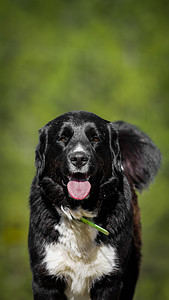
Trainability of Labrador Bernese Mountain Dog
Labernese dogs are known for their trainability and eagerness to please their owners. These intelligent mixed-breed dogs pick up on commands quickly, making them easy to train even for novice dog owners.
Labernese can learn a wide range of obedience and tricks with consistent positive reinforcement training methods. Start obedience training for the Bernese Mountain Dog Lab puppies early to establish good behaviors and manners as they grow older.
Socialization should be part of the training process to ensure that Labernese dogs are comfortable around other animals and people. Properly trained Labernese dogs make wonderful companions who adapt easily to different situations and environments.
Exercise Needs of Bernese Mountain Dog And Lab
Laberneses are energetic and active dogs requiring regular exercise to stimulate them physically and mentally. These friendly giants need at least an hour of exercise daily to prevent boredom and promote a healthy lifestyle.
Whether going for long walks, playing fetch games, or swimming, Laberneses thrive on lots of exercise that challenge their athleticism. Vigorous exercise helps maintain weight and prevents behavioral issues such as excessive barking or destructive behavior.
So if you’re considering bringing home a Labernese, plan for crate training early and an exercise regimen to go along with it. Remember, a tired Labernese is a well-behaved Labernese!
Unique Traits of the Bernese Mountain Lab
The Labernese has a unique love for water and a predominantly black coat, making them stand out among other breeds. They were also specifically created to assist those in need, showcasing their loyalty for elderly people.
Love for Water
Labernese dogs have an innate love for water, a trait they inherit from their Labrador Retriever parent. These playful and adventurous canines enjoy splashing around in lakes, streams, or the backyard pool.
Not only does swimming provide them with great exercise and help to keep them cool on hot days, but it also taps into their natural instincts as water retrievers. Labernese dogs are skilled swimmers and feel most at home when surrounded by water.

Predominantly Black Coat
The Labernese is known for its striking, predominantly black coat, which is one of the unique traits of this mixed breed. The rich black color often dominates their fur, giving them a sleek and stylish appearance.
However, some Labernese dogs may have slight variations in their coat colors due to their Labrador and Bernese Mountain Dog parentage. This beautiful coat adds to their aesthetic appeal and helps protect them from cold weather conditions.
Regular grooming is necessary to keep their coats healthy and shiny, as they are prone to shedding like their parent breeds.
Bernese Lab: Created for Assistance
Laberneses have a unique trait that sets them apart from other mixed-breed dogs – they were created with a purpose. Labernese dogs were initially developed to be assistance dogs, specifically for the Mira Foundation in Canada.
This organization trains and provides service dogs to assist individuals who are blind or visually impaired. The Labrador Retriever’s intelligence and trainability, combined with the Bernese Mountain Dog’s loyalty and devotion, make Laberneses an ideal choice for this important role.
While many Laberneses may not become service dogs, their genetic makeup ensures they inherit these desirable traits of being helpful and reliable companions.
Physical Health and Grooming Needs of the Labernese
Laberneses have moderate grooming needs due to their thick and double coats. They shed moderately throughout the year, so regular brushing is necessary to prevent matting and keep their coat healthy.
Common Health Conditions of the Bernese Mountain Dog And Lab
Labernese dogs are prone to several common health conditions. Regular veterinary checkups are important for early monitoring and addressing weight gain concerns and skin allergies. Here is a list of the most common health issues that Labernese dogs may experience:
| Health Problem | Description |
|---|---|
| Heart Conditions | Labernese dogs can be at risk for various heart conditions, such as mitral valve disease and dilated cardiomyopathy. |
| Hip Dysplasia | This is a common orthopedic condition in large breed dogs like Labernese. It occurs when the hip joint doesn’t develop properly, leading to discomfort and mobility issues. |
| Bloat | Also known as gastric dilation-volvulus, this is a life-threatening condition where the stomach fills with gas and twists on itself. Immediate medical attention is required if bloat is suspected. |
| Obesity | Labernese dogs have a penchant for weight gain if their diet and daily exercise routine are poorly managed. Obesity can lead to numerous health problems, including joint issues and heart disease. |
| Cancer | Like many other dog breeds, Labernese dogs are susceptible to various types of cancer, including mast cell tumors, lymphoma, and osteosarcoma. |
| Progressive Retinal Atrophy (PRA) | PRA is an inherited degenerative eye disorder that can lead to vision loss over time. |
| Ear Infections | Due to their floppy ears and possible water-loving tendencies inherited from Labradors, Labernese dogs may be more prone to ear infections if their ears are not regularly cleaned and dried. |
| Autoimmune Diseases | Some Labernese dogs may develop autoimmune diseases such as lupus or Addison’s disease, which can affect various body systems. |
Diet Requirements For Bernese Mountain Dog Mix
Laberneses require a diet formulated for a large breed with high energy. Here are some important considerations when it comes to their diet:
Provide a balanced and nutritious diet:
Laberneses need a well-balanced diet with high-quality proteins, healthy fats, and carbohydrates to support their growth and energy needs.
Choose the right protein source:
Look for dog food that contains real meat as the primary ingredient, such as chicken, beef, or fish. Avoid foods with fillers or meat by-products.
Control portion sizes:
Labernese puppies should be fed multiple small meals daily to aid in proper digestion and prevent bloating. As they grow older, adjust their portion size based on their activity level and weight.
Avoid overfeeding:
Labernes tend to gain weight easily, so it’s important not to overfeed them. Monitor their calorie intake and consult with your veterinarian to determine the appropriate amount of food for your dog’s age, size, and activity level.
Consider age-specific diets:
Labernese puppies have different nutritional needs than adult dogs. Choose puppy formulas specifically designed for large breeds to ensure they receive the right balance of nutrients for healthy growth.
Provide regular access to fresh water:
Laberneses are active dogs that need plenty of hydration. Make sure your dog always has access to clean drinking water.

Grooming and Maintenance For This Mountain Dog Lab
Labernese dogs have a medium-length, dense, and slightly wavy coat that requires regular grooming and maintenance. Here are some important tips to keep your Labernese looking their best:
- Daily Brushing of their coat at least once or twice weekly to remove loose hair and prevent matting.
- Use a slicker brush or comb to remove tangles and knots from their fur gently.
- Pay extra attention to areas where the fur is thicker, such as behind the ears, on the back of their legs, and around the tail.
- Regular bathing is needed using a gentle dog shampoo. Be sure to rinse thoroughly to avoid any soap residue.
- Trim their nails regularly to prevent overgrowth and discomfort. If you’re uncomfortable doing this yourself, you can take them to a professional groomer.
- Clean their ears regularly with a veterinarian-approved ear cleaner to prevent infections. Check for any signs of redness, inflammation, or foul odor.
- Brush their teeth regularly with a dog-specific toothbrush and toothpaste. This helps prevent dental issues such as tartar buildup and gum disease.
Training and Socializing Your Labernese
Training and socializing your Labernese ensures their well-rounded development and behavior. Labernese dogs are intelligent and eager to please, making them relatively easy to train. Keep a fenced-in yard for your labernese.
Start training your Labernese from a young age using positive reinforcement techniques such as rewards, praise, and treats. Socialization is equally important for a Labernese. Expose them to different people, animals, environments, and experiences in a controlled manner to help them become well-adjusted adults.
Early socialization helps prevent fearfulness or aggression towards strangers or other pets later in life. Labernese dogs are energetic due to their Labrador Retriever lineage; therefore, regular exercise is essential for their physical and mental stimulation. Engage them in activities like playing fetch or going for long walks.
It’s worth noting that Labernese dogs can be sensitive at times; thus, gentle yet firm training methods focus on positive reinforcement rather than harsh discipline techniques.
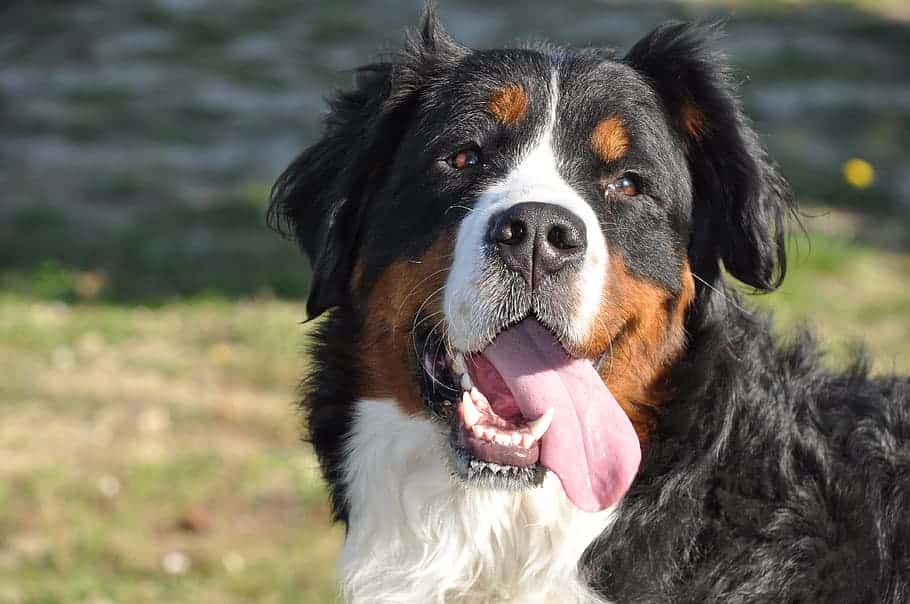
Labernese and Family Life
Laberneses are highly compatible with children and other pets, making them an ideal addition to any family. Their friendly nature and adaptability allow them to thrive in various environments.
Compatibility with Children and Other Pets
Labernese dogs are known for their friendly and gentle nature, making them highly compatible with children and other pets. They have a patient and tolerant disposition, which makes them great playmates for kids of all ages.
Labernese dogs can handle children’s enthusiasm and energy while remaining calm and composed. Regarding other pets, Labernese dogs can coexist peacefully if they are properly socialized from a young age. They tend to have a low prey drive, which means they are less likely to chase or harm smaller animals in the household.
Environmental Adaptability
Laberneses have a remarkable ability to adapt to different environments, making them an excellent choice for families with diverse lifestyles. These dogs thrive in urban and rural settings if their exercise needs are met.
Laberneses are equally comfortable living in apartments or houses as long as they receive regular physical and mental stimulation. While they enjoy spending time indoors with their family, Laberneses love outdoor activities such as walks, hikes, and even swimming, thanks to their Labrador ancestry.
Controversies Surrounding the Labernese and Other Designer Dogs
Controversies surrounding Laberneses and other designer dogs primarily stem from concerns about the breeding program in creating these mixed breeds. Critics argue that intentionally mixing two purebred dogs may lead to potential health issues and genetic defects in their offspring.
They emphasize the importance of strict breeding standards, highlighting that reputable breeders should prioritize the health and well-being of their dogs above all else.
Some controversy arises from the notion that designer dogs are becoming a trend or fashion statement rather than being bred for specific purposes or traits. This has led to an influx of backyard breeders and puppy mills cashing in on the demand for these unique mixes without proper consideration for lineage, genetics, or ethical breeding practices.
Despite these controversies, it is crucial not to overlook the potential benefits of owning a Labernese or any other designer dog. By combining desirable qualities from both parent breeds, Laberneses often exhibit robust physical characteristics and excellent temperaments.
How to Choose a Labernese Puppy?
When choosing a Labernese puppy, consider its size, energy level, and compatibility with your lifestyle. Research reputable breeders who prioritize the health and well-being of their dogs.
Ask for health clearances and meet the puppy’s parents to understand their temperament. Ensure that the breeder provides proper socialization and early training for the puppies. Select a Labernese puppy that will perfectly fit you and your family.
Factors to Consider
- Labernese dogs are a mixed breed, so it’s important to consider the traits and characteristics of both Labrador Retrievers and Bernese Mountain Dogs when deciding if this breed is right for you.
- Labernese dogs require significant exercise, so you should have enough time and energy to provide them with daily physical activity.
- They are generally easy to train and are known for their friendly nature.
- Consider your living situation and if you have enough space for a larger dog, as Labernese can grow to be quite large.
- Labernese dogs may not be suitable for those with allergies or who prefer minimal shedding, as they have thick coats that require regular grooming.
- If you live in a hot climate, consider how well Labernese dogs tolerate heat, as they are a heat-sensitive breed.
Tips for Finding a Reliable Breeder
Finding a reliable breeder is essential when bringing a Labernese puppy into your home. Ensure the breeder conducts health tests and you meet the breeder in person. Here are some rescue centers:-
- Lab Rescue of the Carolinas: This rescue organization is located in North Carolina and South Carolina.
- Lab Rescue of the Mid-Atlantic: This rescue organization is in Pennsylvania, Maryland, Virginia, and West Virginia.
- Lab Rescue of New England: This rescue organization is in Connecticut, Massachusetts, New Hampshire, Rhode Island, and Vermont.
- Labernese Rescue of the Pacific Northwest: This rescue organization is in Washington, Oregon, and Idaho.
Pros and Cons of Owning a Labernese
Like any breed, owning a Labernese has unique advantages and challenges. Here’s a closer look at the pros and cons of welcoming a Labernese into your home.
| Pros | Cons |
|---|---|
| Laberneses are loving and make an affectionate family pet. | They can develop separation anxiety if left alone for long periods. |
| They are intelligent and generally easy to train. | Laberneses need an active life and do well in a house & yard environment. |
| Laberneses are a low-shedding breed that thrives in a bustling family. | They are prone to genetic health issues, including hip dysplasia, bloat, ear infections, arthritis, cancer, and heart conditions. |
| These dogs have specific dietary requirements due to their large size and slower growth rate, meaning they need fewer calories per pound than smaller breeds. | Meeting their dietary needs can be challenging as they need fewer calories per pound. |
| Laberneses are gentle and a low-vigor dog with a laid-back attitude. | They have high energy levels and need lots of training and repetition during training. |
FAQs
1. What is a Labernese?
A Labernese is a mixed breed dog that is a cross between a Bernese Mountain Dog and a Labrador Retriever. This hybrid breed combines the characteristics of both parent breeds, resulting in a friendly, intelligent, and loyal companion.
2. What are the typical traits and temperament of Laberneses?
Laberneses are known for their gentle and affectionate nature. They are typically friendly with everyone they meet, including children and other animals. These dogs are also intelligent and eager to please, making them easy to train. With their strong work ethic inherited from both parent breeds, Laberneses thrive on mental stimulation and physical exercise.
4. How much adequate exercise do Laberneses require?
Laberneses have moderate to high exercise needs due to the energy levels inherited from both parent breeds. Daily walks, runs, and playtime sessions will help keep them physically stimulated and mentally engaged. Providing opportunities for activities like swimming or retrieving games can also satisfy their instincts as sporting dogs while ensuring they stay fit and healthy.
5. What is the meaning of Labernese?
Labernese is a portmanteau of the two dog breeds it is a mix of the Labrador Retriever and the Bernese Mountain Dog. Labernese dogs are typically large, friendly, and gentle dogs. They are known for their loyalty and their love of people.
6. What is the average lifespan of a Labernese?
The Labernese has a shorter lifespan, between 8 and 10 years.
Author Profile

- In House Labrador Trainer
- Samta is an experienced Labrador trainer and enthusiast with over 5 years of hands-on experience, contributing invaluable insights and advice to Labradorandyou.com. Her deep understanding of Labrador temperament and intelligence underpins her effective training techniques and product recommendations. Through firsthand experience of the joys and challenges of raising Labradors, Samta's articles provide expert advice for both seasoned and new Labrador owners, covering training, care, and innovative product selection. Her commitment to enhancing the well-being of Labradors and their owners permeates her work, making it an indispensable resource for Labrador enthusiasts
Also by the author
-
 FAQNovember 16, 2023Why Is My Dog Pooping So Much? MUST KNOW Facts
FAQNovember 16, 2023Why Is My Dog Pooping So Much? MUST KNOW Facts
-
 FAQNovember 16, 2023Why Is My Dog So Skinny? 9 Reasons With Solutions
FAQNovember 16, 2023Why Is My Dog So Skinny? 9 Reasons With Solutions
-
 Mix-BreedsNovember 16, 2023Straight Haired Labradoodles Complete Guide: All You Need To Know
Mix-BreedsNovember 16, 2023Straight Haired Labradoodles Complete Guide: All You Need To Know
-
 Lab-TypesNovember 6, 2023Block Head Labs: Are They Better And Healthier?
Lab-TypesNovember 6, 2023Block Head Labs: Are They Better And Healthier?
